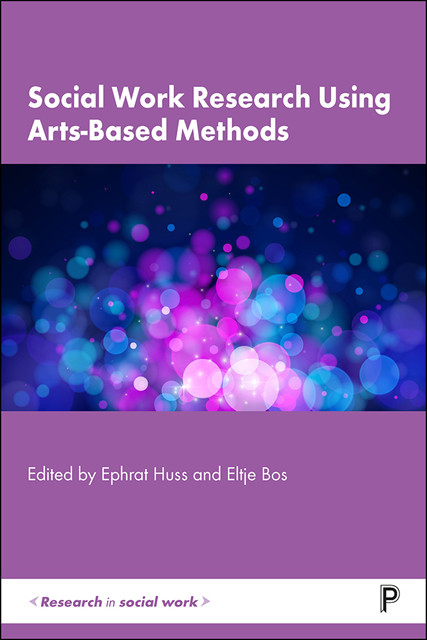Book contents
- Frontmatter
- Dedication
- Contents
- List of figures and tables
- Notes on contributors
- Introduction
- Section I Arts-based research as a method to understand and give voice to marginalised groups
- Section II Using arts-based research to listen to, and give voice to, children in social work
- Section III Arts-based research as a way for researchers and community members to understand communities
- Epilogue
- Index
15 - Building research capacity: scaffolding the process through arts-based pedagogy
Published online by Cambridge University Press: 13 October 2022
- Frontmatter
- Dedication
- Contents
- List of figures and tables
- Notes on contributors
- Introduction
- Section I Arts-based research as a method to understand and give voice to marginalised groups
- Section II Using arts-based research to listen to, and give voice to, children in social work
- Section III Arts-based research as a way for researchers and community members to understand communities
- Epilogue
- Index
Summary
Research into arts-based interventions is complex as art cannot be directly translated into words. Increasingly, there has been a global incessant call for research into using the arts in a range of mental health disciplines. Ongoing debates over methodology, primarily quantitative and qualitative, persist and this just may affect one's decision to engage in research. However, research is needed for a range of reasons including providing evidence of the integrity of a discipline, asserting core competencies of practitioners, for third party and stakeholder purposes including advocacy, the formation of relevant laws, protections, and access to services, and, of course, to highlight emerging trends and contemporary best practices to effectively address a plethora of the complex needs of clients.
As such, arts-based practitioners are uniquely situated to make significant contributions to the research base given their direct engagement with the arts with individuals, families, communities, and society at large (McNiff, 2013; Thomas et al., 2020). Art is rich with metaphor and symbol, and often can be accessed and applied when answers to questions are not easily obtained nor addressed through words alone, even if the art may seem abstract at first (McNiff, 2013; Chilton et al., 2015; Boden et al., 2019; Potash, 2019; Thomas et al., 2020). Indeed, art is not the opposite of research as in the dichotomic paradigm of arts versus science, but rather art, and art making, are a type of research in and of themselves, just as research can also involve creativity and nonlinear engagement (McNiff, 2013; Kapitan, 2018).
The question is how to bridge the divide between practice and research, and arts and science, within the minds of arts-based practitioners. This chapter aims to strategically step back several paces and consider how best to encourage mental health practitioners-in-training to engage in artsbased research practices that are user-friendly, non-threatening, creative, meaningful, and aligned to their discipline. Through a purposefully scaffolded pedagogical approach, arts-based social practitioners can come to terms with their understanding of research and engage in research activity that contributes to larger contexts overall. Arts-based research strategies are gaining increasing acceptance by professional disciplines through research discourse and activity (McNiff, 2013; Boden et al., 2019; Thomas et al., 2020), and are being integrated within training programmes as part of the curriculum.
- Type
- Chapter
- Information
- Social Work Research Using Arts-Based Methods , pp. 170 - 180Publisher: Bristol University PressPrint publication year: 2022

